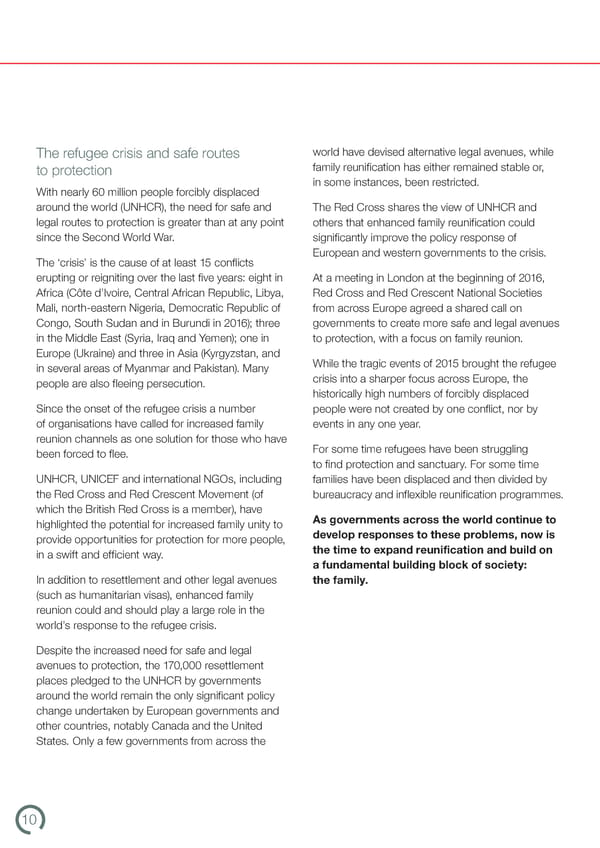The refugee crisis and safe routes world have devised alternative legal avenues, while to protection family reunification has either remained stable or, in some instances, been restricted. With nearly 60 million people forcibly displaced around the world (UNHCR), the need for safe and The Red Cross shares the view of UNHCR and legal routes to protection is greater than at any point others that enhanced family reunification could since the Second World War. significantly improve the policy response of European and western governments to the crisis. The ‘crisis’ is the cause of at least 15 conflicts erupting or reigniting over the last five years: eight in At a meeting in London at the beginning of 2016, Africa (Côte d’Ivoire, Central African Republic, Libya, Red Cross and Red Crescent National Societies Mali, north-eastern Nigeria, Democratic Republic of from across Europe agreed a shared call on Congo, South Sudan and in Burundi in 2016); three governments to create more safe and legal avenues in the Middle East (Syria, Iraq and Yemen); one in to protection, with a focus on family reunion. Europe (Ukraine) and three in Asia (Kyrgyzstan, and in several areas of Myanmar and Pakistan). Many While the tragic events of 2015 brought the refugee people are also fleeing persecution. crisis into a sharper focus across Europe, the historically high numbers of forcibly displaced Since the onset of the refugee crisis a number people were not created by one conflict, nor by of organisations have called for increased family events in any one year. reunion channels as one solution for those who have been forced to flee. For some time refugees have been struggling to find protection and sanctuary. For some time UNHCR, UNICEF and international NGOs, including families have been displaced and then divided by the Red Cross and Red Crescent Movement (of bureaucracy and inflexible reunification programmes. which the British Red Cross is a member), have highlighted the potential for increased family unity to As governments across the world continue to provide opportunities for protection for more people, develop responses to these problems, now is in a swift and efficient way. the time to expand reunification and build on a fundamental building block of society: In addition to resettlement and other legal avenues the family. (such as humanitarian visas), enhanced family reunion could and should play a large role in the world’s response to the refugee crisis. Despite the increased need for safe and legal avenues to protection, the 170,000 resettlement places pledged to the UNHCR by governments around the world remain the only significant policy change undertaken by European governments and other countries, notably Canada and the United States. Only a few governments from across the 10
 How Reuniting Families Can Provide Solutions to the Refugee Crisis Page 9 Page 11
How Reuniting Families Can Provide Solutions to the Refugee Crisis Page 9 Page 11